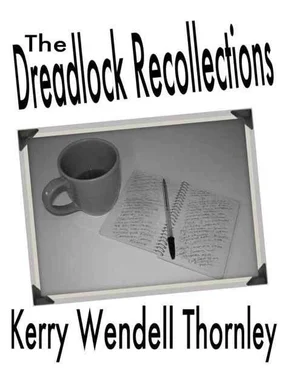"I understand that, but it's rot. Robert Ingersoll refuted that notion magnificently in his writings, and also by the example of his own life. On the other hand, more murders and tortures have been committed in the name of God than for any other reason."
That Brother-in-law would frequently bring up things that seemed related to nothing whatsoever was something I found peevishly irritating. "Have you ever noticed how a saxophone works, Kerry? It is a very complicated instrument. You have to be extremely physically coordinated, and that takes considerable practice and skill. Yet it is something that can be learned."
Then he added that agents in the intelligence community could use similar techniques for conveying data upward in a bureaucracy in such a way as to manipulate their superiors on different sides of a conflict, "just like working a saxophone. Especially double and triple agents can use it, deciding which information to give which boss, and thereby influencing men in power from a position below them."
Another thing he said was, "You know, Kerry, many of the people that serve as espionage agents are not doing it by choice; they are being forced to work against their will by means of extortion, including people who work for our government!"
I explained that I was aware of that much. I had seen a movie based on a true story starring Ernest Borgnine called Man on a String where an American of foreign descent was forced to return to the old country on a "vacation" and spy for the U.S.
"Kerry, have you ever heard the story about the little Dutch boy — the one who saved Holland by plugging the hole in the dike with his finger?"
Another irrelevant comment. It seemed to me to rate an irreverent reply. "Yes. A gay friend of mine in high school used to say, 'Did you hear about the little boy who stuck his finger in the dike? She didn't like it.'" "Tell me something," Brother-in-law replied without laughing at my little joke. "What would you do in a situation like that? That little boy saved his country. But he also starved to death, because nobody found him till after he was dead. How would you handle that type of predicament?"
I answered that I would probably sit there with my finger in the dike constantly thinking of some way to signal for help.
That reply seemed to please him very much.
"And there is also the fable of a king," he continued, "whose people were forbidden to speak to him by a rival monarch, so he worked out a code where every article of clothing and every gesture stood for something, so they could tell him what was going on. Do you think you could do something like that in a similar situation?"
Another time he said, "Kerry, you know, one of the symptoms of schizophrenia is that they develop whole languages of their own, using ordinary words, but ascribing their own private meanings to them."
"Yes, I read that in one of Loy's psychology textbooks from nursing school." Loy was a French Quarter friend, one of my closest, a serene woman with long black hair who made her living as an artist.
"Well I wonder what makes them invent their own secret languages. Why would anyone, especially a crazy person, go to all that trouble?"
"Maybe because they are crazy. One kind of paranoia is paranoid schizophrenia."
"But you know, Kerry, there are some people who have exhibited the symptoms of paranoia who were taken to psychiatrists, and when they began investigating their backgrounds and their life situations they found out the patient was really being persecuted."
"Yeah, you've mentioned that a couple of times before. There are also actual paranoids, though. Not all of them are really being persecuted."
"No, Kerry, not all of them."
One of Brother-in-law's recurring themes was the origin of the word, "Hollywood."
"It is from the holly plant or, to the pagans, the holy plant."
"Yes, there is holly growing in the canyons near Hollywood, California."
Something else he said about Hollywood is vague in my memory now, but it concerned the importance of not remaining in a political condition, having to do with pagan secret societies, that would be called "Hollywood."
Another time he spoke sympathetically of the "Hollywood Ten", the screenwriters who were blackballed for their suspected Communist connections. That was one of those inconsistencies in his politics I found so disconcerting. What business had a Nazi like him worrying about the civil liberties of accused Reds?
What the Communist underground in Italy did to Mussolini and his mistress was another subject he discussed in a way that made him seem, temporarily, more like a leftist than a fascist. Merriment at the torture-murders of Il Duce and his woman dominated his mood at such times.
There was only one way I could take it: this Nazi brother-in-law of Slim's was weird, and Slim's fascination with him was weird, and that's all there was to it.
"Kerry, there are bureaucrats in the CIA who okay things without reading them. Don't you agree that that kind of behavior should be punished?"
"Yes!" I exclaimed. "There is such a thing as criminal negligence. In Manila there were people living in pasteboard hovels who were starving to death, and the Philippines was a US possession until the late forties. That's another example of something made possible only by criminal negligence."
My hypothetical interpretation of the remark about CIA employees is as follows:
Assuming Brother-in-law was a high-level CIA operative, he or someone he knew, possibly Richard Nixon in his Vice Presidential capacity as director of planning the invasion of Cuba, discovered that agency officers routinely okayed project proposals handed them by trusted underlings without first bothering to read them. Thereupon the person making this discovery invented the rationalization for taking advantage of such behavior, that it should be punished, in order to create his own virtual government within the US Security apparatus.
Confirmation for this possibility comes from these statements in the following article reprinted in the March, 1974, issue of The Yipster Times from either The Los Angeles Star or The Boston Real Paper :
"A number of top secret and politically dynamite documents link President Nixon to a plot to kill former President John F. Kennedy, according to private researcher Sherman Skolnick of Chicago. Skolnick referred to one of the documents during a five-hour radio talk show broadcast October 15 over WLS Radio Station in Chicago.
"Skolnick, speaking in the early morning hours on WLS Radio talk show Point-Counterpoint , said the documents were among those being used by E. Howard Hunt and his wife Dorothy to blackmail President Richard Nixon. Skolnick said Mrs. Hunt was carrying the documents with her on United Airlines flight 553 when it crashed last December killing Mrs. Hunt, CBS Newswoman Michele Clark and forty-three others. Skolnick has charged the jet was sabotaged.
"One of the documents the Hunts were using to blackmail the President, according to Skolnick, is a top secret National Security Council memorandum bearing the signature of then President Dwight D. Eisenhower. The memorandum is dated November 22,1960, just weeks after Kennedy was elected President and while Eisenhower was filling out his term as the nation's chief executive.
"The memorandum says, according to Skolnick, that in the opinion of the Eisenhower National Security Council John F. Kennedy's ascendancy to the office of the Presidency was not in the best interests of the country. 'The Eisenhower National Security Council took it upon themselves,' Skolnick said, 'to declare Kennedy a threat to the national security.'
"The private researcher said the NSC document recommends 'in so many words' that JFK be dealt with so he could not hold the office of the Presidency. The memorandum, according to Skolnick, 'recommends that Kennedy be murdered.'…
Читать дальше












